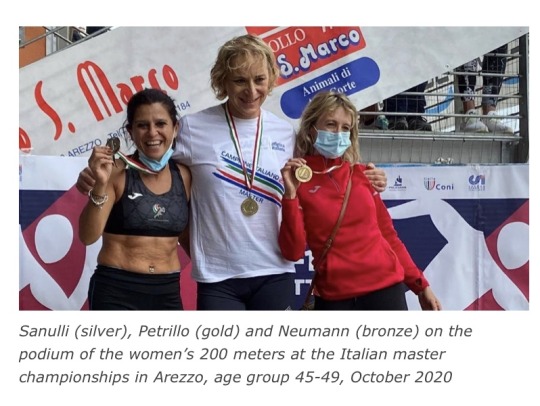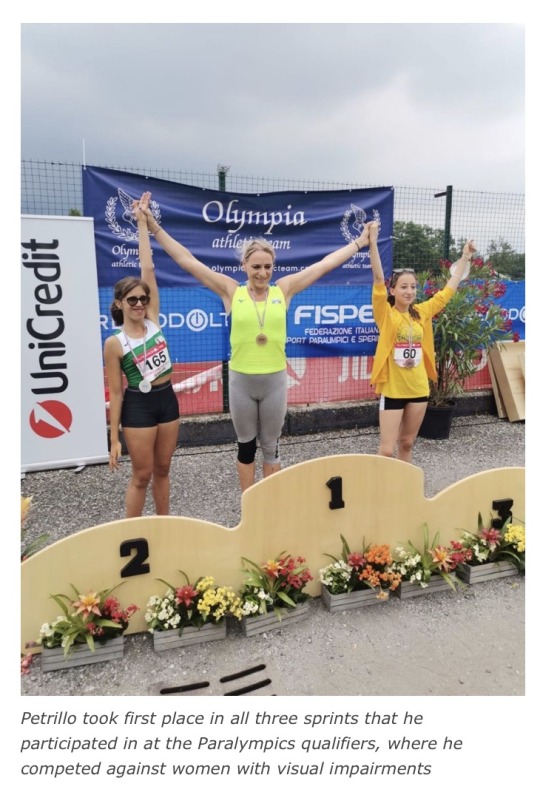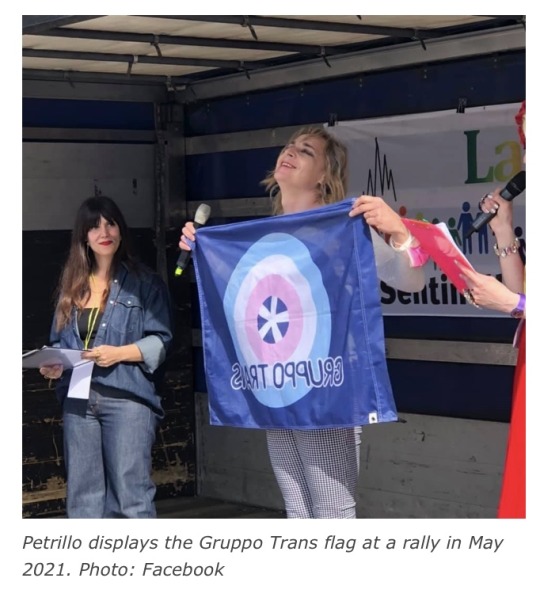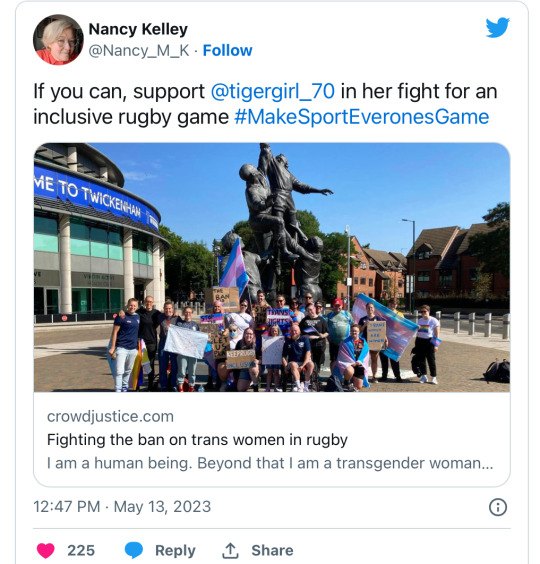#Another trans identified male who started by stealing his mothers clothes
Explore tagged Tumblr posts
Text
Women’s sports is not a retirement plan for old men
A 50-year-old trans-identified male runner has seized his eighth championship title in a women’s category after smashing the competition at the Italian Indoor Masters Championship in Ancona.

On March 12, Valentina Petrillo, born Fabrizio, competed in the 200m race for women aged 50 to 54. Marco Alciator, a statistician, was present at the championship to monitor Petrillo’s performance and provided a report to the Italian Feminist Post on what he witnessed.
Alciator recorded that that a difference in “physicality [was] immediately noticeable,” and that the female competitors were unable to hold their own against Petrillo, who effortlessly dominated the competition.
But Petrillo’s prowess in women’s athletic competitions is hardly praiseworthy, says Alciator, who notes that if Petrillo had been competing in the equivalent men’s race, he wouldn’t have even broken the top 10.
“Were it not for the fact that Petrillo is still unbelievably entitled to compete in the women’s category, he would have finished 14th place in the M50 category.”
Following Petrillo’s victory, the female athlete who came in second place expressed that she felt disappointed in the results. Cristina Sanulli would have come in first place, and set a women’s indoor running record, if not for Petrillo.
“We do not feel equal, precisely because [Petrillo’s] physical structure is male,” Sanulli said to Alciator. “So we are not running at par. Although the [personal] path Valentina has taken is respectable… athletically speaking it is not, and because of this we feel very discriminated against.”
At the end of the race, a spectator could be heard shouting, “Brava, Cristina!” a cheer that received applause from other athletes. This show of support for Sanulli enraged Petrillo, Alciator says, who then shouted several times in response: “Dedicated to all those who want to hurt me!”
Leading up to the latest race, a women’s rights advocacy group called RadFem Italia contacted government officials to ensure that Petrillo would not be granted access to the women’s locker rooms. In response, Petrillo was provided with a designated changing room reserved especially for him at the Italian Masters Championships in Ancona.
On March 16, Petrillo again lashed out in a Facebook post wherein he equated criticism of his presence in women’s sports to Nazism, telling detractors they were “on the same level as Hitler,” and comparing sex-based sports categories to a 1936 ban on Jewish athletes.
Upset at being denied the use of the women’s locker room, Petrillo wrote, “In Ancona, you made me have a terrible time, it is not fair… you’ve relegated me to a ‘dedicated’ locker room,” a situation which he claimed was similar to the segregation of those called appestati, or sufferers of a plague.

A number of female athletes and professional experts have been highlighting concerns about Petrillo’s participation in the women’s category. At the Master’s Athletics Championships in Arezzo in October 2020,
Petrillo outpaced Sanulli and Denise Neumann, both of whom had previously won world and European Masters titles and have been regarded as the best in their events.
The athletes took the podium with Petrillo at the time to avoid becoming embroiled in controversy, but later stated that they felt that Petrillo had an unfair advantage.
“I didn’t feel like I competed as an equal. It was my race, my goal for the season. I had been preparing it for a long time and I wanted to win,” Sanulli said at the time.
Sanulli and Neumann were among more than 30 female Master athletes who signed a petition in 2021 opposing men being permitted to identify into women’s sports.
The women were represented by Italian lawyer and athletics champion Mariuccia Fausta Quilleri, who claimed that the admission of male athletes in women’s competitions constitutes a violation of Article 1 of the Code of Equal Opportunities between Men and Women. The petition was sent to the president of the Italian Athletics Federation, Stefano Mei, the Minister for Equal Opportunities, Elena Bonetti, and the undersecretary of state for sport, Valentina Vezzali. According to RadFem Italia, their efforts were not acknowledged by the government officials.

Petrillo currently holds 8 women’s running championship titles, but failed to earn even one while competing as a male. In January 2019, Petrillo changed his name to Valentina and began taking estrogen. The following year, he began competing against female athletes and has since broken multiple Italian women’s running records.
Petrillo has been diagnosed with Stargardt disease, a disorder of the eye that causes retinal degeneration over time. Due to this visual impairment, he has been permitted to compete in both matches designated for women with disabilities, as well as those which are not.
In September 2020, Petrillo raced in the women’s 100-, 200- and 400-meter competitions at the Italian Paralympic Athletics Championships in Jesolo, despite having not undergone the procedure euphemistically labeled sex reassignment surgery.
Additionally, Petrillo had not altered his identification documents, which still listed his sex as male, though this did not deter him from being granted permission to enter the match. He won first place in all three races and therefore qualified to represent Italy at the Tokyo Olympic Games.
At the last minute, however, the Italian government intervened and barred Petrillo from competing against women with disabilities at the Paralympics in 2021. The International Olympics Committee (IOC) had just announced updates to guidelines for trans-identifying competitors stating that male athletes must keep the levels of their testosterone below 10 nanomoles per liter for at least 12 months in order to participate.
After being awarded three gold medals at the Paralympics qualifiers, Petrillo dedicated his victory to Bologna-based trans activist organization Gruppo Trans APS, headed by a trans-identifying male named Milena Bargiacchi.
“I dedicated to them my victory in my favorite race,” Petrillo told OutSports. “Gruppo Trans supported me in my darkest hour, and they helped me find the answers I needed when I was questioning my identity and my life.”

Gruppo Trans’ website has a section dedicated to outreach for crossdressers, where counseling and Zoom sessions are offered. The point of contact is a man called Charlotte Verniani, who runs a lingerie and sex shop and engages in a fetish practice called “female masking,” a sexual activity which involves men donning a silicone “female” face mask, or, on occasion, a full-body silicone “woman suit.”
Speaking about his history with the BBC in June 2021, Petrillo said: “Until four years ago, if you’d talked to Fabrizio (the name Petrillo was given at birth), Fabrizio would have given you the idea he was sexist. He was a tough guy who’d speak dismissively of women and then be a woman in his private space.”
Petrillo has stated that he used to “try on his mother’s clothes” when he was younger, a behavior that until recently was considered a symptom of a sexual disorder known as transvestic fetishism. He has also said that prior to declaring a transgender identity, Petrillo would steal his wife’s clothing. While describing a memory of “touching” his mother’s skirt for the first time, Petrillo said, “It was an incredible emotion. It was like touching heaven with your finger tip.”

Gruppo Trans lobbies for males to be allowed to compete in women’s sports, and runs a program called QueerFit, a fitness course that offers “genderless changing rooms” and guarantees “privacy” of participants by allowing them to join using an alias.
The organization frequently employs Petrillo as a representative, and he has spoken for Gruppo Trans on several occasions. Gruppo Trans is backing a documentary film about Petrillo’s life called “5 Nanomoles – The Olympic Dream of a Trans Woman.” The title is a reference to the maximum testosterone limit set by World Athletics in 2019 for trans-identifying males in order for them to be eligible to compete against women.
In addition to partnering with Petrillo to campaign for males in women’s athletics events, Gruppo Trans also discusses “trans adolescents” and offers a variety of “training” programs through their website. Corporate diversity management training, courses for health care workers, and gender identity workshops for teachers are all available, as are lessons for children intended to be provided by instructors at schools.
#Italy#Italian Indoor Masters Championship#Valentina Petrillo is a Fabrizio#Cristina Sanulli Was robbed#RadFem Italia#And he received his own changing room?#Trans identified male calling critics the same as Nazis#He thinks not having access to the Women’s restroom is the same as segregation of plague victims#He only started transitioning in 2019?#Another trans identified male who started by stealing his mothers clothes
330 notes
·
View notes
Text
Stonewall UK is backing a guy suing to be included in women’s sports even though he “maintained a personal blog for a number of years, where he has written about having had a cross-dressing fetish since he was a child, and that this fetish was something that impacted his ability to retain jobs and marriages alike.” This is what I mean when I say the TQ+ community is dragging themselves down by backing these freaking instead of distancing themselves.
A trans-identified male who goes by the Julie-Anne Curtiss is suing England’s Rugby Football Union (RFU) over their decision to ban males from playing in the female category. Curtiss claims that RFU’s policy breaches the Equality Act of 2010 and his human rights.
Last week, the CEO of Stonewall UK, Nancy Kelley, publicly promoted a crowdfunder for Curtiss’ legal fight against the RFU and said, “If you can, support [Curtiss] in her fight for an inclusive rugby game #MakeSportEveryonesGame.”

In the description on his fundraiser, Curtiss shared that he began his “transition” in 2016 and is perceived “as female” by his “female friends, colleagues, loved ones and most relevantly, by [his] female rugby team mates.”
Curtiss writes that: “Trans women come in all shapes, sizes and ability levels, just like cisgender women,” in an apparent effort to compare larger-bodied females to men. He continues, “The new RFU policy has no nuance and instead has decided all trans women to be excluded. It is difficult to see how this broad-brush approach can be ‘necessary.’”
RFU’s policy to exclude males from female sport is described as an “injustice” and Curtiss asks readers for assistance with legal fees and “expert evidence.”
As of the writing of this article, €6,550 (approx. $7,000 USD) of a €20,000 (approx. $21,500 USD) goal has been raised.
Curtiss has maintained a personal blog for a number of years, where he has written about having had a cross-dressing fetish since he was a child, and that this fetish was something that impacted his ability to retain jobs and marriages alike.
In one post, he says that his desire to become a girl could partly be explained by the fact that “the girls’ side of [his] school seemed to me to be more ‘peaceful’ and certainly less overtly aggressive.”
He added that at eight years old he would dress in his sisters’ clothes and “loved the softness and it made me feel something deeply emotional inside.”
In another post, Curtiss says: “I never wanted to have homosexual sex, but strongly desired to have sex with a man, as a woman.”
Curtiss admitted that into his young adulthood, his cross-dressing compulsion was so bad that he would steal his step-mother’s clothing. His step-mother “tried to deal with this by locking her dressing room, which [he] got around by stealing and copying a key.”
Curtiss said “Despite the seeming normality of my life…I just could never shake or get beyond this yearning to be a girl. I was so jealous of the way girls were able to dress. I loved the idea of being able to wear make-up, mini-skirts and long hair. It drove me crazy… I didn’t want to be a man in girl’s clothes… I wanted to BE a girl.”
He continued to share that as an adult when he lived by himself he was pleased to dress however we wanted at home, “…but no matter how hard I tried, I was always consumed by the fact that I was a man-in-drag, not a woman.”
He mentions his exposure to pornography, “Unfortunately all I was exposed to was the weird world of transsexuals through porno magazines and I didn’t identify with that either. It seemed to me that even if I could re-assign my gender, I would forever be on the periphery of society, not able to lead a normal life and still not be considered a real woman.”
In May of 2016, Curtiss started his public display of his “womanhood,” writing on his blog that he “didn’t look particularly convincing, but “… internally I finally felt whole. Since then, rather than being asked to leave my job I’ve been extended 6 times!”
In August of 2022, Curtiss compared trans-identified males not being allowed to play in women’s sport with racist South Africa, writing: “Many have been surprised by my connecting this issue to Apartheid South Africa. Here’s a little history lesson. The Apartheid regime premised their ideology on the ‘fact,’ as they saw it, that people of colour (POC) were sub-human and therefore needed to be treated differently.”
Cutiss quietly deleted the multi-post thread after receiving backlash.
Earlier this year, Curtiss was interviewed by ESPN UK, where he announced his legal challenge to RFU’s ban on male players in the female category.
In a video that has since been widely shared, Curtiss can be seen towering over much younger female athletes. He stated that critics who oppose male players in sports for women and girls “need to be dragged, kicking and screaming if necessary,” until policies favoring gender identity over biological sex are accepted.

It was in July of 2022 that the RFU shared their decision to revise their “gender participation policy” and exclude anyone “recorded male at birth” from participating in female contact rugby.
The organization shared that their extensive review and consultation process of the policy concluded, with peer reviewed research, that the physical differences between men and women are too stark to ignore.
Male “advantages in strength, stamina and physique brought about by testosterone and male puberty are significant and retained even after testosterone suppression,” meant that the RFU could not justify allowing men to compete against women in safety and fairness.
Anticipating controversy, their decision was paired with ample statements regarding the thoroughness of the “research” that went into their ultimate revision of the gender policy.
“The RFU recognises this was a complex and difficult decision and the policy change was not taken lightly or without thorough and full research and consultation.”
Jeff Blackett, RFU President, even released a personal statement with the decision: “I would like to thank everyone for the passion, time and effort that has been put in to consulting with us and informing this policy review. Inclusion is at the heart of rugby values and we will continue to work with everyone to keep listening, learning and finding ways to demonstrate there is a place for everyone in our game. We know that many will be disappointed by this decision however, it has been based on all the scientific evidence available. Our game can be strengthened by everyone who is involved; be it in coaching, refereeing, administration or supporting and playing non-contact forms of the game.”
Curtiss has shared that his solicitors sent a pre-action letter to the RFU “asking it to explain why it thinks its new policy is lawful,” and confirmed that the RFU responded and “seems intent on defending its policy.” The RFU’s response letter wasn’t shared to the public by Curtiss due to confidentiality.
While Curtiss admits that his legal battle against the RFU “has to specifically focus on how the policy has impacted [him] personally,” he hopes that this will “influence the RFU’s approach more generally” for “every trans woman and girl who wants to play contact rugby [with women].”
Earlier this year, World Athletics, the international governing body for the sport of athletics, followed the RFU’s decision to ban males from competing against women. World Athletics’ previous guidelines allowed men to compete in the female division if they had suppressed their testosterone levels below a certain threshold – a standard which critics pointed out was set to as much as five times higher than the average amount of the hormone found in females.
World Athletics since announced that male competitors who have gone through male puberty are not permitted to compete in the female categories of international competitions.
FINA, the international swimming world’s governing body, also voted to ban trans-identified males from elite female competitions if they had undergone male puberty.
Earlier this year, the Scottish Rugby Union also banned trans-identified males from competing in women’s contact rugby, citing the safety of female players.
By Yuliah Alma
Yuliah is a junior researcher and journalist at Reduxx. She is a passionate advocate for women's rights and child safeguarding. Yuliah lives on the American east coast, and is an avid reader and book collector.
#England’s Rugby Football Union (RFU)#equality act 2010#stonewall UK#A dude compared not being able to play on women’s teams with apartheid South Africa
5 notes
·
View notes